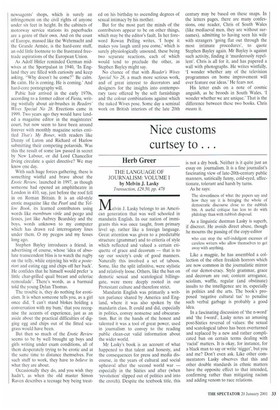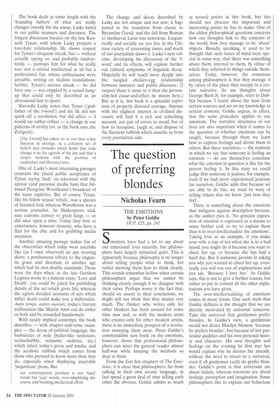Nice customs curtsey to . . .
Herb Greer
THE LANGUAGE OF JOURNALISM: VOLUME I by Melvin J. Lasky Transaction, £29.50, pp. 478 Melvin J. Lasky belongs to an American generation that was well schooled in mandarin English. In our nation of immigrants this was once taught, from primary level up, rather like a foreign language. Great attention was given to a predictable structure (grammar) and to criteria of style which reflected and valued a certain etiquette of grace and decorum — that is to say our society's code of good manners. Naturally this involved a set of taboos. Some, like the split infinitive, were stylistic and relatively loose. Others, like the ban on demotic sexual and scatological billingsgate, were more deeply rooted in our Protestant culture and therefore strict.
Mandarin English was primarily a written parlance shared by America and England, where it was also spoken by the mandarin class. It could and did, especially in politics, convey nonsense and obscurantism. But in the hands of the honest and talented it was a tool of great power, used in journalism to convey to the reading public clean-cut valid information about the wider world.
Mr Lasky's book is an account of what happened to that talent and honesty, and the consequences for press and media discourse, in the years of cultural and social upheaval after the second world war — especially in the Sixties and after (when 'revolution' slipped out of politics and into the crotch). Despite the textbook title, this is not a dry book. Neither is it quite just an essay on journalism. It is a fine journalist's fascinating view of late-20th-century public manners, satirically funny, cold-eyed, affectionate, tolerant and harsh by turns.
As he says:
The slovenliness of what the papers say and how they say it is bringing the whole of democratic discourse close to the rubbish bin. A useful critique has less to do with philology than with rubbish disposal.
As a linguistic dustman Lasky is superb, if discreet. He avoids direct abuse, though he mourns the passing of the copy-editor
who can stop the self-indulgent excesses of careless writers who allow themselves to get away with anything.
Like a magpie, he has assembled a collection of the often freakish horrors which are now common in the journalistic mirror of our demot-cracy. Style grammar, grace and decorum are out; content arrogance, sciolism, waffle, regular (and obstinate) insults to the intelligence are in, especially in politics and the arts. The book's proposed 'negative cultural tax' to penalise such verbal garbage is probably a good idea.
In a fascinating discussion of 'the n-word' and 'the f-word', Lasky notes an amusing post-Sixties reversal of values: the sexual and scatological taboo has been overturned and replaced by a new and rather complicated ban on certain terms dealing with 'racial' matters. It is okay, for instance, for a black man to say or write 'nigger', but you and me? Don't even ask. Like other commentators Lasky observes that this and other double standards in ethnic matters have the opposite effect to that intended, confirming rather than mitigating racism and adding venom to race relations. The book deals at some length with the 'founding fathers' of what are really changes (mostly for the worse, Lasky hints) in our public manners and discourse. The longest discussion focuses on the late Kenneth Tynan, with whom Lasky projects a love-hate relationship. He shows respect for Tynan's eloquent streak, but — without actually saying so, and probably inadvertently — portrays him for what he really was: not a critical intellectual at all but a professional fan, whose enthusiasms were unstable, resting on shallow foundations; further, Tynan's serious streak — he did have one — was crippled by a sexual hangup that could only be described as an obsessional lust to epater.
Shrewdly Lasky notes that Tynan (godfather of the f-word') and his ilk did not spark off a revolution, but did affect — I would say rather reflect — a change in our patterns of civility (or, as the book says, the Zeitgeist).
[The f-word] has taken on in our time a key function in ideology, in a coherent set of beliefs and attitudes which holds that rude change is on the agenda of the day and that a utopia beckons with the promise of unabashed and liberated love.
One of Lasky's most interesting passages contrasts the placid public acceptance of Tynan saying 'fuck' on television with the uproar (and personal media ban) that followed Peregrine Worsthorne's broadcast of the same expletive. But of course Tynan, like his fellow sexual 'rebels', was a species of licensed fool, whereas Worsthorne was a serious journalist. As Shakespeare said, nice customs curtsey to great kings — or did once upon a time. Today they bow to entertainers, however demotic, who have a flair for the chic and for grabbing media attention.
Another amusing passage makes fun of the obscenities which today wear asterisks like (as I once observed) an ape wearing skirts: a posthumous tribute to the linguistic grace and decorum of another age which had its own double standards. Those were the days when, as the late Gershon Legman wrote in a famous essay, 'Love and Death', you could be jailed for publishing details of the act which gives life; whereas the ugliest detailed accounts of acts which inflict death could make you a millionaire. Autre temps, autres moeurs; today's literary millionaires like Martin Amis can do either or both and be rewarded handsomely.
With neatly implied contempt, the book describes — with chapter-and-verse examples — the decay of political language, the barbarities of style (bullet-like sentences, technobabble, semantic oedema, etc.) which infect today's press and media, and the sciolistic rubbish which comes from those who pretend to know more than they do, especially when deploying execrable jargontuan' prose. But
our contemporary problem is not `hard' words but 'easy' words, over-simplifying discourse and blocking intellectual effort.
The change and decay described by Lasky are not unique and not new; it happened in the transition from classic to Byzantine Greek; and the fall from Roman to mediaeval Latin was notorious. Linguistically and socially we too live in the Chinese variety of interesting times, and much of our journalism shows it. Lasky's next volume, developing his discussion of the 'fword' and its effects, will explore further our cultural symptoms of linguistic decay. Hopefully he will reach more deeply into the tangled chicken-egg relationship between manners and public discourse. (I suspect there is more to it than the personality-led cause-and-effect he moots here.) But as it is, this book is a splendid explosion of properly directed outrage. Anyone with the slightest interest in civilised discourse will find it a rich and refreshing account, not just of errors to avoid, but of how to recognise, laugh at, and dispose of the flatulent rubbish which assaults us from every journalistic side.































































 Previous page
Previous page